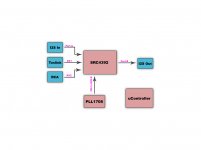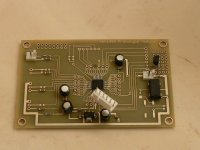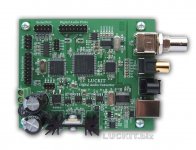Hello,
I'm planning to build a DAC and I want to use ASRC to reduce jitter of the input signal. So there's a simple question: which one should i use: SRC4392 or AD1896?
The TI chip has separate curves for IP and OP dig servo loop
response. I am presuming the OP loop attenuates the ref clock
jitter and IP loop attenuates jitter from receiver portion of the
chip (whic has it's own PLL). Besides that, SRC has a steeper rolloff, 80dB/decade, compared to the AD chip at about 40dB/decade. However the AD chip starts a little sooner having better attenuation sub 20Hz.
Cheers!
I'm planning to build a DAC and I want to use ASRC to reduce jitter of the input signal. So there's a simple question: which one should i use: SRC4392 or AD1896?
The TI chip has separate curves for IP and OP dig servo loop
response. I am presuming the OP loop attenuates the ref clock
jitter and IP loop attenuates jitter from receiver portion of the
chip (whic has it's own PLL). Besides that, SRC has a steeper rolloff, 80dB/decade, compared to the AD chip at about 40dB/decade. However the AD chip starts a little sooner having better attenuation sub 20Hz.
Cheers!
I’m new to this, so I hope I’ve done this right. After long debates I've come to the conclusion that it's easier/simplest for me to use SRC4392 since it have on chip "Integrated Digital Audio Interface Receiver" (S/PDIF Transmitter it's not important for me right now). It also provides two Digital Audio ports and separated inputs for Master and DIR PLL clocks. Even that, my question is still on. Later I will probably build a board to test AD1896 performances (with CS8416 as S/PDIF receiver).
Any other suggestions would be greatly appreciated!
Lorien
Any other suggestions would be greatly appreciated!
Lorien
Attachments
AD1896 and SRC4192 are pincompatible, pinconfigurable.
Unfortunately I didn't success with SRC, its just generated noise.
After changing SRC with AD1896, it works fine.
Unfortunately I didn't success with SRC, its just generated noise.
After changing SRC with AD1896, it works fine.
An externally hosted image should be here but it was not working when we last tested it.
Ipanema said:Your board looks really neat. Which method are you using to make them?
made by ExpressPCB.com, "MiniBoard" service.
3.5x2.5 in board x 3 = $51 +ship&Tax. about $20 per 1 board.
Hello guys! Thanks for replies!
to KOON3876:
Very nice prototype board! Is there a chance to build the firmware for SRC4392 in the future?

Still... is anyone here who already tested SRC4392? Any opinions about output signals?
Regards
to KOON3876:
Very nice prototype board! Is there a chance to build the firmware for SRC4392 in the future?
This aren't good news since SRC4392 is an improved vesion of SRC4192 ASRC.AD1896 and SRC4192 are pincompatible, pinconfigurable.
Unfortunately I didn't success with SRC, its just generated noise.
After changing SRC with AD1896, it works fine...
Still... is anyone here who already tested SRC4392? Any opinions about output signals?

Regards
I've used the 4392 in a couple of designs already. It's a good chip, like a CS8420 "done right". It does 192KHz, decent SRC, a proper differential input mux (not the multiple-RXP, single-RXN CS8416 thing) and I've yet to see the 4392 do the odd singing-in-the-shower-sound stuff that the 8420 does if you disconnect its input a bunch of times.
Though compared to a CS8416+AD1896 combo, it does require a bit more feeding; the SRC4392 needs a 1.8V core supply (extra LDO) and it won't do 5V interfacing without external logic. And there's no "hardware mode", you need to have a micro nearby to blast SPI/I2C at the '4392 to configure it at startup.
The SRC4392 has one advantage which helped me out in one case; you can hook up a 29MHz oscillator to RXCKI to clock the SRC, and a 24.576MHz to MCLK to clock the I2S serial ports. This lets the SRC4392 run a 192KHz master mode output, something you can't do with an AD1896.
The jitter rejection of both parts are pretty good, both are reliable, there's nothing really wrong with either approach. Best choice? *shrug*. Depends on your application.
Though compared to a CS8416+AD1896 combo, it does require a bit more feeding; the SRC4392 needs a 1.8V core supply (extra LDO) and it won't do 5V interfacing without external logic. And there's no "hardware mode", you need to have a micro nearby to blast SPI/I2C at the '4392 to configure it at startup.
The SRC4392 has one advantage which helped me out in one case; you can hook up a 29MHz oscillator to RXCKI to clock the SRC, and a 24.576MHz to MCLK to clock the I2S serial ports. This lets the SRC4392 run a 192KHz master mode output, something you can't do with an AD1896.
The jitter rejection of both parts are pretty good, both are reliable, there's nothing really wrong with either approach. Best choice? *shrug*. Depends on your application.
Lorien said:to gmarsh:
SRC4392's ASRC work above 192 khz.Have you tried 216 fs in one of your design?
Lorien
Haven't tried it. I don't have an AES generator that can generate >192KHz, and I clock the ASRC at 27.0MHz (not 27.7) yielding a maximum 210KHz input/output sample rate.
I can verify that the 4392 will do 192KHz in, 192KHz out in my own experience. But believing the datasheet, there's no reason the chip can't do 216 KHz.
Hello,
I build some code (written in C language) to configure SRC43x2 at startup and change its internal registers in run time as fast as uController can be (below 40 MHz which is '43x2 SPI speed limit). I use some built-in functions available in C compiler to simulate SPI interface. Speed is afected that way... even that it works very well. It's in beta form so there's still some work to do.
cheers
I build some code (written in C language) to configure SRC43x2 at startup and change its internal registers in run time as fast as uController can be (below 40 MHz which is '43x2 SPI speed limit). I use some built-in functions available in C compiler to simulate SPI interface. Speed is afected that way... even that it works very well. It's in beta form so there's still some work to do.
cheers
- Status
- This old topic is closed. If you want to reopen this topic, contact a moderator using the "Report Post" button.
- Home
- Source & Line
- Digital Source
- SRC4392 or AD1896


